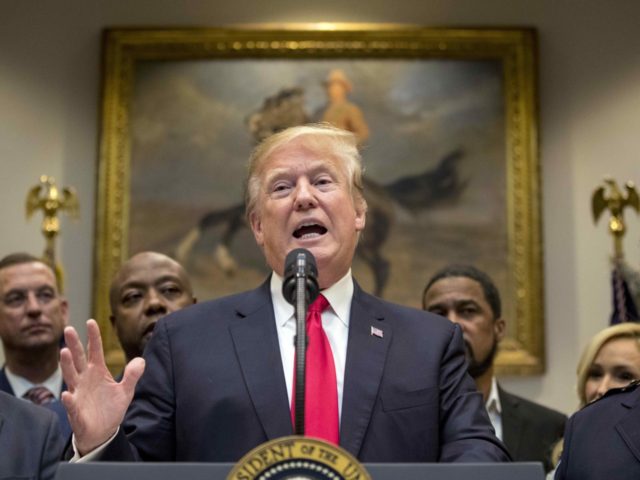President Donald Trump announced Wednesday afternoon that he will support the First Step Act, a bipartisan effort at prison reform that is backed by leaders in the black community as well as prominent law enforcement groups.
Speaking from the Roosevelt Room, Trump thanked a group Republican politicians who made the new legislation possible — including Sens. Chuck Grassley (R-IA), Lindsey Graham (R-SC), Mike Lee (R-UT), Tim Scott (R-SC), and Rand Paul (R-KY); and Reps. Bob Goodlatte (R-LA) and Doug Collins (R-GA). Trump hailed the bill as “bipartisan,” and it passed the House with some Democratic support, though he did not name specific Democrats.
“Did I hear the word ‘bipartisan’?” the president asked, to laughter. “Did I hear that word? Huh? That’s a nice word.”
Trump noted that the “booming” economy was providing “more opportunities than they’ve ever had before” for prisoners to find jobs upon their release. The First Step act, the president added, would help that process.
He also acknowledged the work of Jared Kushner, his son-in-law and White House advisor, on the issue. To that end, Kushner has met with leading prison reform activists, including CNN’s Van Jones, Kanye West, and others.
Broadly, he said, the bill had three aims: first, to provide incentives for prisoners to commit to vocational training; second, to place federal prisoners closer to home, to keep them in touch with family; third, to reform sentences to be tougher on “dangerous and violent” criminals but more lenient to those who present a low risk to society.
As The Atlantic noted after the House passed the bill in May, Democrats are deeply divided over the legislation:
The 360–59 vote came despite a late push against the bill from some civil-rights groups, former Attorney General Eric Holder, and a coalition of leading Senate Democrats, including Dick Durbin of Illinois, Cory Booker of New Jersey, and Kamala Harris of California. In a letter released last week, the senators said the measure would be “a step backwards” and that prison reform would fail if Congress did not simultaneously overhaul the nation’s sentencing laws. Also signing the letter were Representative Sheila Jackson Lee of Texas and Representative John Lewis of Georgia, the civil-rights icon whose opinion is widely respected by Democrats.
The missive infuriated Representative Hakeem Jeffries of New York, a rising progressive voice among House Democrats who negotiated the First Step Act with Representative Doug Collins, a Georgia conservative. Jeffries fired off his own seven-page letter rebutting the bill’s critics point by point. “The letter, unfortunately, is riddled with factual inaccuracies and deliberately attempts to undermine the nationwide prison reform effort,” Jeffries wrote.
In an interview, Jeffries criticized what he called the “all-or-nothing approach” of the bill’s opponents and said they were unrealistic to think a broader sentencing-reform package could make it into law with Republicans in control of Congress, Trump in the White House, and Sessions atop the Justice Department. “There is no possibility of meaningful sentencing reform at this time,” Jeffries told me.
The Democratic quandary on the prison bill is a familiar one for a party out of power: Do they seize an opening to work with the administration to make incremental progress on a key priority, or wait for the chance to tackle the issue on their own terms once they take back control?
Trump noted that the legislation aimed specifically to fix the “disproportionate” impact of President Bill Clinton’s “crime law” — the The Violent Crime Control and Law Enforcement Act of 1994 — on the black community.
He also noted that the Fraternal Order of Police and the International Association of Police Chiefs were among the law enforcement organizations that had supported the First Step Act, in addition to faith-based organizations.
In a message to the incoming Congress — half of which will be led by Democrats, after recent elections — Trump said: “Today’s announcement shows that true bipartisanship is possible, and maybe it will be thriving, if we’re going to get something done. When Republicans and Democrats talk, debate, and seek common ground, we can achieve breakthroughs that move our country forward and deliver for our citizens. And that’s what we’re doing today.”
Later, on CNN, Rep. Hakeem Jeffries (D-NY), who co-sponsored the bill in the House, said the bill “absolutely can present an opening” to bipartisanship, citing possible cooperation with the White House on infrastructure and prescription drug prices: “We think there are bipartisan avenues of support available to getting something done.”
Joel B. Pollak is Senior Editor-at-Large at Breitbart News. He is a winner of the 2018 Robert Novak Journalism Alumni Fellowship. He is also the co-author of How Trump Won: The Inside Story of a Revolution, which is available from Regnery. Follow him on Twitter at @joelpollak.

COMMENTS
Please let us know if you're having issues with commenting.